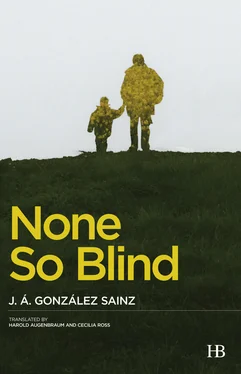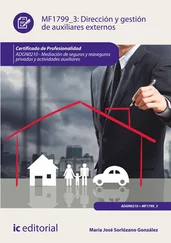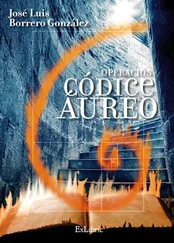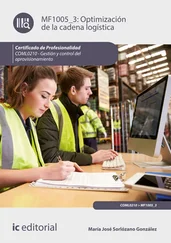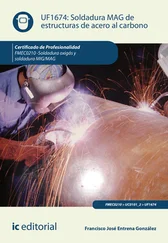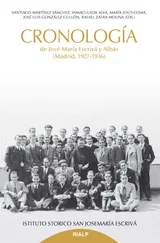“You know something?” the father cut him off cleanly before turning on his heels, his heart in his throat, and going out to walk, without knowing why, along that same road with the metalworks and the tire retread shop and then the giant wall of that huge, overwhelming hangar, and after that the lot at the gas station, chock-full of parked cars and trucks at that hour on a Saturday, which he tried to make his way through as best he could, his insides all tied up in knots, in order to carry on. “You know something? Your father may not know a whole heckuva lot, and he may be just as poor and unimportant as you say, but there’s one thing he does know, and it’s this: that in this world, some things are fair and some things are unfair; some things are as they should be and some things are complete madness, no matter how you slice them; some things, like in the country, grow healthy and it does you good to see them, but then some things are so puny and so riddled with disease it’s as if they brought it on themselves; and some things seem to naturally bring about a general good and other things bring nothing but calamity and atrocity to everyone around them. Some things are true, really and truly true, and some things are no more than hogwash and evil illusions, and some things are lawful and others are unlawful, some are tolerable and others are unequivocally intolerable, like terrorizing, intimidating and offending people, not to mention killing people, killing anyone, for any reason whatsoever. And I also know, no matter how much you might mock me, that some things are truly noble and some things are true, colossal shams, some are worthy and some are filthy and repugnant and worthless, some things are doable and some things impossible and treacherous, and some do good for the majority of people and some, sooner or later, are counterproductive for almost everybody, even for those who prattle on the entire livelong day about them.
“There’s a fine line between them, and it’s true that at times, rather than a confusing or a changeable line, it’s a skittish line, as my father used to say, or as people said he used to say, and sometimes it seems it’s in one place and other times it’s in another place, and a lot of the time it gives the impression it’s neither in the one nor the other, but every thing, just like every field, just like every garden, no matter how big it is, has, in the end, invariably, a dividing line, and there is a limit to everything, and a limit of all limits — You hear me? Do you hear me? Would you do me the blasted favor of listening to me for once in your life? — and if you cross that line, there will most likely be no going back, no matter how much ideological tommyrot you try dishing out or how much immoral lunacy you’re willing to put up with, and that line is the life of others, you hear me? It’s the life of human beings, which is sacred, even though you might laugh when I use the word, just as you might laugh if I mentioned honor , other people’s honor and your own honor, and scruples , too, scruples about hurting others, and the humiliation of being hurt, but it doesn’t matter — other people’s honor and scruples about hurting them, as my father, may he rest in peace, used to say, those are the fine lines that give worth to your own freedom and the freedom of others.
“And I also know that one thing is a thing itself, and another, very different thing is the way it’s tinkered with and twisted, it’s exploitation — and these are your words I’m using, mind; and I know that of course each of us sees and thinks in his own way, but as convinced as someone may be that he is right about something, or in the right about something (and you can always convince yourself of whatever you like and for whatever reason, as your grandfather apparently always used to say, too), that doesn’t mean that other people are under any obligation to see and think like him, nor that that person has the right to any such a thing, much less any kind of historical right, as you put it without, I believe, understanding a blessed word, and I know that a person, not to belabor the point, can do whatever he wants, it’s true, but not just whatever he feels like, meaning that he can do what he likes, as long as he doesn’t bother or intimidate or frighten anybody else, or, of course, lay a single finger on them. Do you understand me, my son?”
With his mouth half open, his upper lip raised slightly at its left corner, his eyes a bit dulled and oddly fixed, and with his chin lifted a touch and his head cocked and tilted to one side, he stood there when he’d finished, staring at him with a look that wasn’t merely of surprise or lack of understanding, nor was it of disdain, exactly, or contempt or slandered petulance alone, but all of that at the same time, as well — very especially — as disgust, revulsion, and illimitable, deaf, impotent spite, a deeply insurmountable spite toward someone who, if given the chance, he wouldn’t have thought twice about squashing like a bug right then and there.
He’d called him son, my son , he’d had the audacity to call him my son not only after not having called him that for so long but, as if that weren’t enough, after this diatribe of his, as direct and devastating as a fist, unchallengeable, in which he’d given him the piece of his mind he should have given him long ago, and on top of all that, after he’d had to stand there hearing him out, and hell if he knew how he’d had the patience to stand there and hear that whole thing out, that repulsive sermonizing that passed for a response out of this self-righteous, small-town yokel, this insignificant, laughable piece of shit who’d had the nerve to unleash this diatribe on him as if he were some small-town priest, a sour, dried-out old schoolmaster who has no idea, who doesn’t have a clue about anything, or like some mutt dragging itself along the side of the highway, pleading loudly for some unstoppable higher force to squash him once and for all and remove him already from the face of this earth.
6
Although he saw him at the house from time to time after that dustup, they didn’t address more than a few perfunctory words or curt remarks to one another, and when he found out from his wife that he had gone — gone, according to what she said, to France and to work — he felt something akin to relief. You’ll regret it soon enough, said one of those friends of his who at other times had also told him that he just didn’t get it.
One of the last times he saw him, if not the last time itself — actually it was only a moment as he came out of his bedroom and went through the dining room on his way to the front door — was a Sunday afternoon at the beginning of November, the weather was still pleasant, and everybody, except his wife, had stayed at home in the apartment. He was more sunk in his easy chair than stretched out on it, like on a lot of other Sunday afternoons, when he spent his time waiting for Asun to show up and get their dinner together, and keeping his younger son, Felipe, company; that day, he was focused on the plant collection he kept. His wife spent a lot of afternoons with her friends — or whatever they were — at some association he didn’t know a thing about, nor did he want to, and some days, but especially Saturdays and Sundays, she would often get home late, as a rule after the league soccer games that were blasting on television and radio sets all over the neighborhood were over.
One by one, his younger son was laying out on the expanded dining room table, which he had completely taken over, the samples of plants he had collected the previous day. He was placing them between the folds of sheets of newsprint, on top of which, like a press, he then placed several fat volumes of the encyclopedia, and then, taking care to follow the same numbering he had assigned to each of the plants he had placed there to dry, he wrote on little slips of cream-colored paper their common and scientific names, and the place and date he had collected each of them. He wrote with a very careful hand, diligently, with a painstakingness that one might say was oblivious not only to the passage of time that afternoon but also to the fact that he was sitting there in that space, among the garish furniture that was too big for the small size of the room and very uncomfortable and almost impractical, to the point that it seemed to be arguing with whoever was using it. Later, as he contemplated each and every plant as if it were a miracle, he would read aloud the characteristics that described them scientifically, and his face would light up when he saw how much the scientific description and the classified reality coincided, the words he read and the thing he had there, right in front of his eyes.
Читать дальше
